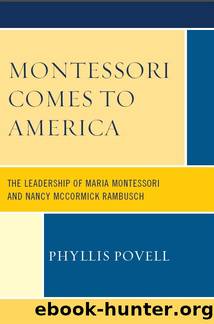Montessori Comes to America by Phyllis Povell

Author:Phyllis Povell [POVELL, PHYLLIS]
Language: eng
Format: epub
ISBN: 978-0-7618-4928-5
Publisher: UPA
In the spring of 1962, Nancy published a book Learning How to Learn: An American Approach to Montessori. She described the reaction to this first book to placing Montessori education into a contemporary American setting, âLetters and people poured into Whitby from across the United States, demanding insistently that writers and visitors be given help in starting Montes-sori schools and teacher training programs.â68
Nancy resigned as Headmistress of Whitby School in 1962, in order to devote more time to the day-to-day functioning of the American Montessori Society. The aforementioned Jack Blessington became Headmaster, where he remained until 1973 when Paul Czaja assumed the position. By 1966 with an enrollment of two hundred students, Whitby announced its plans to build the first Montessori high school in America by the following winter with the goal of doubling its enrollment.
On December 19, 1962 in a letter to Mario Montessori, Nancy resigned as President of the American Montessori Society effective July 1963. Hurt and disappointment are evident in her words, âThis year for the first time, I received remuneration from the Montessori Society. In years past, I received none. I would prefer a relationship in which I could help in whatever way possible without continuing to assume the problems and absorb all the abuse that has been showered on me from every quarter.â
She continued the letter with an explanation which displayed her honesty and integrity to Montessori and the Montessori Movement. She spelled out her beliefs, âIt would have been easy for me, ten years ago, to have returned from Europe and submerged the name of Montessori and promoted these ideas in some other way. It was not my intent to do so. I think this would be criminal neglect of the genius of Dr. Montessori, as well as an intellectually dishonest move.â Furthermore the letter revealed she was disheartened by the fact that she gave not only her time, âbut that of my husband and children, over almost a decade.â69
Royall OâBrien, at the tenth anniversary of the American Montessori Society, echoed the same themes, âOften misunderstood, even by those who followed her, often told âit couldnât be done,â often abandoned . . . Nancy never gave up, never compromised, never retreated.â70
Although very involved with the teacher training program and the promotion of Montessori education, Nancy knew it would be wise to have a degree in early childhood education so she entered Teachers College Columbia University. In 1963 she received a Master of Arts degree in Early Childhood Education. She began a PhD program, but did not finish it there.
In 1977, she received her Ed.D. from the University of Massachusetts at Amherst. Her doctoral dissertation was entitled, Intuitive and Intentional Change Agentry. It is an autobiographical detailing of her exploration into the literature on change and a description of her intuitive understandings during the reintroduction of Montessori to the United States. It also includes her acquired knowledge resulting in her intentional efforts to actuate change in three other situations.
While pursuing her doctorate, in the academic
Download
This site does not store any files on its server. We only index and link to content provided by other sites. Please contact the content providers to delete copyright contents if any and email us, we'll remove relevant links or contents immediately.
Spare by Prince Harry The Duke of Sussex(5166)
Navigation and Map Reading by K Andrew(5142)
Tuesdays with Morrie by Mitch Albom(4753)
Machine Learning at Scale with H2O by Gregory Keys | David Whiting(4281)
Cracking the GRE Premium Edition with 6 Practice Tests, 2015 (Graduate School Test Preparation) by Princeton Review(4263)
Never by Ken Follett(3918)
Goodbye Paradise(3790)
What It Really Takes to Get Into Ivy League and Other Highly Selective Colleges by Hughes Chuck(3727)
Fairy Tale by Stephen King(3354)
Harry Potter and the Prisoner of Azkaban (Book 3) by J. K. Rowling(3337)
Pledged by Alexandra Robbins(3166)
Kick Ass in College: Highest Rated "How to Study in College" Book | 77 Ninja Study Skills Tips and Career Strategies | Motivational for College Students: A Guerrilla Guide to College Success by Fox Gunnar(3106)
Reminders of Him: A Novel by Colleen Hoover(3062)
A Dictionary of Sociology by Unknown(3057)
Sapiens and Homo Deus by Yuval Noah Harari(3051)
The Social Psychology of Inequality by Unknown(3009)
Graduate Admissions Essays, Fourth Edition: Write Your Way into the Graduate School of Your Choice (Graduate Admissions Essays: Write Your Way Into the) by Asher Donald(2897)
Will by Will Smith(2891)
Zero to Make by David Lang(2769)
